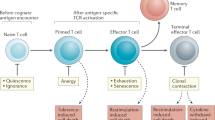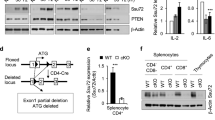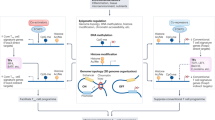Abstract
TRAF6 has a key role in the regulation of innate immune responses by mediating signals from both TNF receptor and interleukin-1 receptor/Toll-like receptor superfamilies. Here we show that T cell–specific deletion of TRAF6 unexpectedly results in multiorgan inflammatory disease. TRAF6-deficient T cells exhibit hyperactivation of the phosphatidylinositol 3-kinase (PI3K)-Akt pathway compared with wild-type T cells and, as a result, become resistant to suppression by CD4+CD25+ regulatory T cells. These data identify a previously unrecognized role for TRAF6 in the maintenance of peripheral tolerance, and suggest the presence of a T cell–intrinsic control mechanism to render responder T cells susceptible to tolerizing signals.
This is a preview of subscription content, access via your institution
Access options
Subscribe to this journal
Receive 12 print issues and online access
$209.00 per year
only $17.42 per issue
Buy this article
- Purchase on Springer Link
- Instant access to full article PDF
Prices may be subject to local taxes which are calculated during checkout




Similar content being viewed by others
References
Dempsey, P.W., Doyle, S.E., He, J.Q. & Cheng, G. The signaling adaptors and pathways activated by TNF superfamily. Cytokine Growth Factor Rev. 14, 193–209 (2003).
Chung, J.Y., Park, Y.C., Ye, H. & Wu, H. All TRAFs are not created equal: common and distinct molecular mechanisms of TRAF-mediated signal transduction. J. Cell Sci. 115, 679–688 (2002).
Wu, H. & Arron, J.R. TRAF6, a molecular bridge spanning adaptive immunity, innate immunity and osteoimmunology. Bioessays 25, 1096–1105 (2003).
Ye, H. et al. Distinct molecular mechanism for initiating TRAF6 signalling. Nature 418, 443–447 (2002).
Cao, Z., Xiong, J., Takeuchi, M., Kurama, T. & Goeddel, D.V. TRAF6 is a signal transducer for interleukin-1. Nature 383, 443–446 (1996).
Lomaga, M.A. et al. TRAF6 deficiency results in osteopetrosis and defective interleukin-1, CD40, and LPS signaling. Genes Dev. 13, 1015–1024 (1999).
Kobayashi, T. et al. TRAF6 is a critical factor for dendritic cell maturation and development. Immunity 19, 353–363 (2003).
Mackey, M.F., Wang, Z., Eichelberg, K. & Germain, R.N. Distinct contributions of different CD40 TRAF binding sites to CD154-induced dendritic cell maturation and IL-12 secretion. Eur. J. Immunol. 33, 779–789 (2003).
Akiyama, T. et al. Dependence of self-tolerance on TRAF6-directed development of thymic stroma. Science 308, 248–251 (2005).
Bachmaier, K. et al. Negative regulation of lymphocyte activation and autoimmunity by the molecular adaptor Cbl-b. Nature 403, 211–216 (2000).
Fang, D. et al. Dysregulation of T lymphocyte function in itchy mice: a role for Itch in TH2 differentiation. Nat. Immunol. 3, 281–287 (2002).
Liu, Y.C. Ubiquitin ligases and the immune response. Annu. Rev. Immunol. 22, 81–127 (2004).
Chiffoleau, E. et al. TNF receptor-associated factor 6 deficiency during hemopoiesis induces Th2-polarized inflammatory disease. J. Immunol. 171, 5751–5759 (2003).
Hennet, T., Hagen, F.K., Tabak, L.A. & Marth, J.D. T-cell-specific deletion of a polypeptide N-acetylgalactosaminyl-transferase gene by site-directed recombination. Proc. Natl. Acad. Sci. USA 92, 12070–12074 (1995).
Fontenot, J.D., Gavin, M.A. & Rudensky, A.Y. Foxp3 programs the development and function of CD4+CD25+ regulatory T cells. Nat. Immunol. 4, 330–336 (2003).
Hori, S., Nomura, T. & Sakaguchi, S. Control of regulatory T cell development by the transcription factor Foxp3. Science 299, 1057–1061 (2003).
Khattri, R., Cox, T., Yasayko, S.A. & Ramsdell, F. An essential role for Scurfin in CD4+CD25+ T regulatory cells. Nat. Immunol. 4, 337–342 (2003).
Salomon, B. & Bluestone, J.A. Complexities of CD28/B7: CTLA-4 costimulatory pathways in autoimmunity and transplantation. Annu. Rev. Immunol. 19, 225–252 (2001).
Singh, B. et al. Control of intestinal inflammation by regulatory T cells. Immunol. Rev. 182, 190–200 (2001).
Thornton, A.M., Donovan, E.E., Piccirillo, C.A. & Shevach, E.M. Cutting edge: IL-2 is critically required for the in vitro activation of CD4+CD25+ T cell suppressor function. J. Immunol. 172, 6519–6523 (2004).
Thornton, A.M. & Shevach, E.M. Suppressor effector function of CD4+CD25+ immunoregulatory T cells is antigen nonspecific. J. Immunol. 164, 183–190 (2000).
Rudd, C.E. & Schneider, H. Unifying concepts in CD28, ICOS and CTLA4 co-receptor signalling. Nat. Rev. Immunol. 3, 544–556 (2003).
Alegre, M.L., Frauwirth, K.A. & Thompson, C.B. T-cell regulation by CD28 and CTLA-4. Nat. Rev. Immunol. 1, 220–228 (2001).
Parsons, M.J. et al. Expression of active protein kinase B in T cells perturbs both T and B cell homeostasis and promotes inflammation. J. Immunol. 167, 42–48 (2001).
Read, S., Malmstrom, V. & Powrie, F. Cytotoxic T lymphocyte-associated antigen 4 plays an essential role in the function of CD25(+)CD4(+) regulatory cells that control intestinal inflammation. J. Exp. Med. 192, 295–302 (2000).
Acknowledgements
We thank the University of Pennsylvania Cancer Center Flow Cytometry Core for assistance with FACS; and A. Kuan, M. Walsh and E. Wilson for critical suggestions and technical assistance. This work is supported in part by grants from US National Institutes of Health (to Y.C., L.T.)
Author information
Authors and Affiliations
Corresponding author
Ethics declarations
Competing interests
The authors declare no competing financial interests.
Supplementary information
Supplementary Fig. 1
Generation of TRAF-ΔT mice using CD4-Cre mice. (PDF 1070 kb)
Supplementary Fig. 2
Immune cell infiltration in TRAF6-ΔT mice. (PDF 253 kb)
Supplementary Fig. 3
Phenotypic analysis of 10-week-old mice created by crossing floxed TRAF6 mice with Lck-Cre transgenic mice. (PDF 1991 kb)
Supplementary Fig. 4
TRAF6-ΔT mice do not exhibit any obvious abnormalities in central tolerance. (PDF 1286 kb)
Supplementary Fig. 5
Lymphoproliferative inflammatory disease in mixed chimera mice generated by reconstituting irradiated mice (CD45.1) with T cell—depleted bone marrow from both control (CD45.1) and TRAF6-ΔT mice, at 1:1 ratio. (PDF 1856 kb)
Supplementary Fig. 6
TRAF6-ΔT CD4+ T cells exhibit normal TCRβ downregulation. (PDF 491 kb)
Supplementary Fig. 7
TRAF6 negatively regulates PI3K-Akt activation. (PDF 613 kb)
Supplementary Fig. 8
TRAF6-ΔT CD4+ T cells exhibit normal susceptibility to Fas-mediated apoptosis. (PDF 310 kb)
Rights and permissions
About this article
Cite this article
King, C., Kobayashi, T., Cejas, P. et al. TRAF6 is a T cell–intrinsic negative regulator required for the maintenance of immune homeostasis. Nat Med 12, 1088–1092 (2006). https://doi.org/10.1038/nm1449
Received:
Accepted:
Published:
Issue Date:
DOI: https://doi.org/10.1038/nm1449
This article is cited by
-
The OX40-TRAF6 axis promotes CTLA-4 degradation to augment antitumor CD8+ T-cell immunity
Cellular & Molecular Immunology (2023)
-
Deregulation of circ_003912 contributes to pathogenesis of erosive oral lichen planus by via sponging microRNA-123, -647 and -31 and upregulating FOXP3
Molecular Medicine (2021)
-
PD-L1+ and XCR1+ dendritic cells are region-specific regulators of gut homeostasis
Nature Communications (2021)
-
Targeting NF-κB pathway for the therapy of diseases: mechanism and clinical study
Signal Transduction and Targeted Therapy (2020)
-
CARD–BCL-10–MALT1 signalling in protective and pathological immunity
Nature Reviews Immunology (2019)



